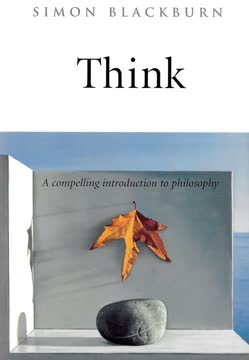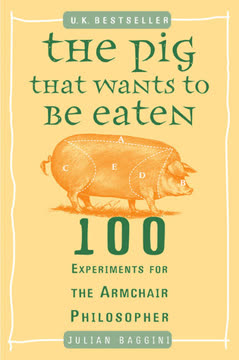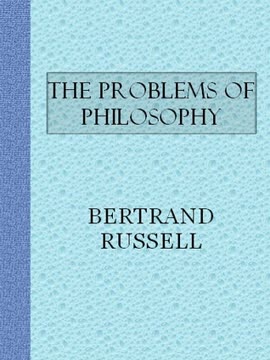Key Takeaways
1. The Ancient World Laid the Foundation for Western Thought
Truth resides in the world around us.
Early Inquiries. Ancient Greek philosophers like Thales sought rational explanations for the cosmos, moving away from mythological accounts. Thales proposed that everything was made of water, marking the beginning of scientific thought. Pythagoras saw mathematics as the key to understanding the universe, influencing later thinkers like Plato.
Moral and Ethical Focus. Socrates shifted the focus to ethics, questioning assumptions about the good life and justice. His student, Plato, explored the nature of reality and knowledge, while Aristotle emphasized observation and logic. These thinkers established the processes of philosophy, ways of thinking, and organizing thoughts.
Eastern Philosophies. Simultaneously, Eastern philosophies like Daoism and Buddhism emerged, focusing on moral and political philosophy. Confucius emphasized social harmony and ethical conduct, while Siddhartha Gautama sought enlightenment through the elimination of desire. These diverse approaches laid the groundwork for future philosophical inquiry.
2. Medieval Philosophy Sought to Reconcile Faith and Reason
The life which is unexamined is not worth living.
Integration of Faith and Reason. Medieval philosophy was characterized by attempts to reconcile Greek philosophy with religious doctrine. St. Augustine integrated Platonism into Christian thought, while Boethius translated Aristotle's logic. This period saw the rise of scholasticism, which used dialectical reasoning to justify faith.
Eastern Influences. Islamic scholars preserved and translated Greek texts, introducing them to Europe. Avicenna explored the relationship between the soul and the body, while Averroes sought to reconcile philosophy and religion. These thinkers contributed to the intellectual ferment of the medieval world.
Challenges to Dogma. Despite the dominance of religious thought, some philosophers challenged conventional wisdom. St. Anselm attempted to prove God's existence through reason, while Nikolaus von Kues explored the concept of God as the "not-other." These thinkers paved the way for the intellectual revolutions of the Renaissance.
3. The Renaissance Sparked a Rebirth of Classical Ideas
Doubt is not a pleasant condition, but certainty is absurd.
Rediscovery of Classical Thought. The Renaissance saw a renewed interest in Greek and Roman culture, leading to new perspectives on politics, art, and science. Niccolò Machiavelli explored the nature of power in The Prince, while Michel de Montaigne questioned traditional values in his Essays. This period marked a shift from religious dogma to human-centered inquiry.
Scientific Revolution. The scientific revolution challenged established beliefs about the universe. Nicolaus Copernicus proposed a heliocentric model, while Galileo Galilei provided evidence for it. These discoveries undermined the authority of the Church and paved the way for new scientific and philosophical approaches.
Emphasis on Individualism. Renaissance thinkers emphasized the importance of individual experience and reason. Francis Bacon advocated for empirical observation, while René Descartes sought certainty through rational doubt. These ideas laid the foundation for the Enlightenment and the rise of modern science.
4. The Age of Reason Emphasized Rationality and Individual Liberty
I think therefore I am.
Rationalism and Empiricism. The Age of Reason saw the development of two major philosophical schools: rationalism and empiricism. René Descartes emphasized the power of reason, while John Locke stressed the importance of experience. These contrasting approaches shaped the course of Western philosophy.
Social Contract Theory. Thinkers like Thomas Hobbes and Jean-Jacques Rousseau explored the nature of government and the rights of citizens. They proposed models of society based on social contracts, where individuals agree to give up certain freedoms in exchange for protection and order. These ideas influenced the American and French Revolutions.
Moral and Political Philosophy. Immanuel Kant sought to reconcile rationalism and empiricism, while also exploring the foundations of morality. Jeremy Bentham advocated for utilitarianism, which aimed to maximize happiness for the greatest number. These thinkers laid the groundwork for modern ethical and political thought.
5. The 19th Century Saw the Rise of New Ideologies and Social Critiques
Every man takes the limits of his own field of vision for the limits of the world.
Critique of Idealism. Arthur Schopenhauer challenged the idealism of Hegel, emphasizing the role of will and suffering in human existence. Ludwig Feuerbach critiqued religion, arguing that theology is anthropology. These thinkers paved the way for new perspectives on human nature and society.
Social and Economic Theories. Karl Marx developed a theory of historical materialism, arguing that class struggles drive social change. John Stuart Mill advocated for individual liberty and social reform. These thinkers shaped the course of political and economic thought in the 19th century.
Existentialism and Individualism. Søren Kierkegaard explored the nature of faith and the individual's relationship with God. Friedrich Nietzsche challenged traditional morality and proclaimed the "death of God." These thinkers laid the groundwork for existentialism and the emphasis on individual freedom and responsibility.
6. The Modern World Grapples with Existentialism and the Limits of Knowledge
Man is something to be surpassed.
Existentialism and Being. Friedrich Nietzsche's proclamation of the "death of God" led to a crisis of meaning in the modern world. Philosophers like Karl Jaspers and Martin Heidegger explored the nature of existence and the individual's search for meaning. These thinkers laid the groundwork for existentialism and the emphasis on individual freedom and responsibility.
Linguistic Analysis. Ludwig Wittgenstein explored the limits of language and the nature of meaning. Edmund Husserl developed phenomenology, a method for studying consciousness. These thinkers shaped the course of analytic philosophy and the emphasis on language and experience.
Social and Political Thought. Philosophers like Ahad Ha'am and William du Bois addressed issues of identity, race, and social justice. These thinkers challenged traditional power structures and advocated for equality and liberation. Their ideas continue to resonate in contemporary social and political movements.
7. Contemporary Philosophy Explores Identity, Language, and Power
Language is a skin.
Post-Structuralism and Deconstruction. Roland Barthes explored the nature of language and its relationship to power. Jacques Derrida developed deconstruction, a method for analyzing texts and revealing their inherent contradictions. These thinkers challenged traditional notions of meaning and interpretation.
Feminist Philosophy. Luce Irigaray and Julia Kristeva explored the relationship between gender, language, and power. They challenged traditional philosophical concepts and advocated for new ways of thinking about identity and difference. Their ideas have had a profound impact on feminist theory and practice.
Social and Environmental Ethics. Philosophers like Peter Singer and Arne Naess addressed issues of animal rights and environmental ethics. They challenged anthropocentric views and advocated for a more inclusive and sustainable approach to life. Their ideas continue to shape contemporary ethical debates.
Last updated:
FAQ
What's The Philosophy Book about?
- Comprehensive Overview: The Philosophy Book by Will Buckingham provides a thorough exploration of major philosophical ideas and thinkers throughout history, from ancient to modern times.
- Key Philosophers and Theories: It covers influential figures like Socrates, Plato, Aristotle, Descartes, Kant, Nietzsche, and Marx, detailing their contributions to ethics, metaphysics, epistemology, and more.
- Accessible Presentation: The book simplifies complex concepts, making them accessible to readers of all backgrounds, using diagrams, illustrations, and quotes to clarify philosophical ideas.
Why should I read The Philosophy Book?
- Beginner-Friendly: Designed for readers without a background in philosophy, it offers a clear introduction to complex ideas without overwhelming jargon.
- Engaging Format: The use of visual aids and witty quotes makes the material engaging and helps reinforce understanding and retention.
- Broad Coverage: It provides a comprehensive resource for exploring the history of philosophy and its relevance to contemporary issues.
What are the key takeaways of The Philosophy Book?
- Philosophy as Inquiry: Emphasizes that philosophy is about questioning and exploring fundamental truths, not just finding answers.
- Interconnected Ideas: Illustrates how philosophical ideas are interconnected, showing the influence of earlier thinkers on later ones.
- Practical Application: Encourages applying philosophical thinking to personal life, promoting critical thinking and self-reflection.
What are the best quotes from The Philosophy Book and what do they mean?
- "The unexamined life is not worth living.": Socrates highlights the importance of self-reflection and critical thinking for a meaningful life.
- "Knowledge is power.": Emphasizes the value of knowledge in empowering individuals to make informed decisions and progress.
- "Man is the measure of all things.": Protagoras suggests that human perception shapes our understanding of reality, indicating truth's subjectivity.
How does The Philosophy Book define knowledge?
- Justified True Belief: Discusses the classical definition of knowledge as “justified true belief,” foundational in epistemology.
- Skepticism and Certainty: Addresses skepticism, questioning whether true knowledge is possible, and presents philosophical responses.
- Empirical vs. Rational Knowledge: Contrasts knowledge gained through sensory experience with that derived from reasoning.
What is the significance of the Socratic method in The Philosophy Book?
- Dialogue and Inquiry: Presented as a foundational approach, emphasizing dialogue and questioning to uncover deeper truths.
- Moral Exploration: Used by Socrates to explore ethical concepts, prompting examination of beliefs about virtue and morality.
- Philosophical Legacy: Laid the groundwork for future discourse, influencing countless thinkers and shaping philosophical practice.
How does The Philosophy Book address the relationship between philosophy and science?
- Philosophy as Foundation: Discusses how philosophy provides foundational principles for scientific inquiry and theory development.
- Limits of Empirical Knowledge: Highlights limitations of empirical knowledge, arguing that science cannot answer all philosophical questions.
- Interdisciplinary Connections: Illustrates how philosophical questions often arise from scientific discoveries, enriching both fields.
What role does ethics play in The Philosophy Book?
- Moral Philosophy Exploration: Delves into ethical theories like utilitarianism, deontology, and virtue ethics, applying them to real-world dilemmas.
- Ethics and Society: Discusses the relationship between ethics and societal norms, encouraging reflection on justice and morality.
- Practical Application: Advocates for applying ethical reasoning to everyday life, considering moral implications of actions and decisions.
How does The Philosophy Book define existentialism?
- Individual Experience Focus: Emphasizes individual existence, freedom, and choice, exploring life's meaning from a personal perspective.
- Confronting Absurdity: Discusses existentialists' confrontation with life's absurdity and inherent meaninglessness, leading to personal meaning search.
- Influential Thinkers: Highlights key figures like Sartre and Kierkegaard, showcasing their contributions to understanding human existence.
How does The Philosophy Book explore the relationship between philosophy and politics?
- Political Philosophy: Examines questions of power, justice, and the state's role, discussing thinkers like Hobbes, Rousseau, and Marx.
- Ethics and Governance: Explores how moral principles inform governance and social structures, highlighting philosophy's societal importance.
- Contemporary Issues: Links historical theories to current political challenges, encouraging application of philosophical insights to modern events.
What is the impact of feminism in The Philosophy Book?
- Feminist Philosophy: Presents feminist philosophy as a critical lens for examining traditional ideas, highlighting figures like Simone de Beauvoir.
- Critique of Patriarchy: Explores challenges to patriarchal assumptions, advocating for inclusive understanding of gender and identity.
- Intersectionality: Emphasizes intersectionality, recognizing gender's intersection with race, class, and sexuality, enriching social justice discussions.
How does The Philosophy Book illustrate the concept of dualism?
- Mind-Body Distinction: Discusses dualism through Descartes' work, arguing for mind and body as distinct substances.
- Philosophical Implications: Explores implications for understanding the relationship between mental states and physical processes.
- Critiques of Dualism: Addresses critiques, including physicalist arguments that mental phenomena can be explained physically.
Review Summary
The Philosophy Book receives mostly positive reviews, praised for its accessible introduction to philosophy and comprehensive overview of major thinkers. Readers appreciate the clear explanations, illustrations, and global perspective. Some criticize its lack of depth on certain topics. The book is recommended for beginners, students, and those seeking a refresher. Reviewers note its usefulness as a reference guide and its ability to spark interest in further philosophical exploration. Overall, it's considered a valuable resource for understanding the basics of philosophy.
Similar Books








Download PDF
Download EPUB
.epub digital book format is ideal for reading ebooks on phones, tablets, and e-readers.





